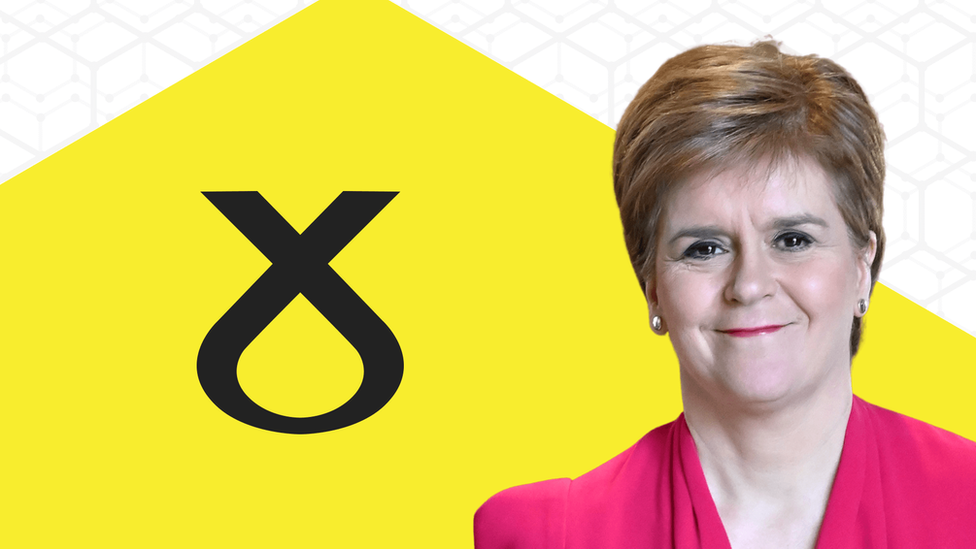Scottish election 2021: A simple guide to the Scottish Greens
- Published
The Scottish Greens are to unveil their manifesto for next month's Scottish Parliament election.
The party won six seats in the last election in 2016, but were left with five when MSP Andy Wightman quit the party last year and sat as an independent instead.
Scottish Greens primarily exist to champion environmental causes but are keen not to be seen as a single-issue campaign party and have policies in all areas - and are strong supporters of Scottish independence.

Scottish Greens co-leaders Patrick Harvie and Lorna Slater
Who is the leader?
The Scottish Greens adopted a new constitution in 2019 to replace its previous co-convener position with elected co-leaders, one of whom must be a woman.
Patrick Harvie and Lorna Slater were elected for a two-year term in August of that year.
Mr Harvie has been an MSP since 2003 and has campaigned on a range of issues, from asylum and civil liberties to sexual health and food policy, and was a prominent campaigner for the Yes campaign during the independence referendum.
The co-leader Lorna Slater has stood as a candidate in several previous elections, and this time is standing to become the MSP for Edinburgh Northern and Leith and is also on Lothian regional list.
Ms Slater, who is originally from Canada, is an electro-mechanical engineer working in marine renewable energy.

SCOTLAND ALERTS: Get extra updates on BBC election coverage

What do they need to do to win the election?
The Scottish Greens need 60 more MSPs to be elected to form a government on their own. Realistically, the party will be aiming to win their highest-ever number of MSPs, and to help secure a pro-independence majority in the Scottish Parliament.
Key Policies
A fair and green recovery from the pandemic
Tackle the climate emergency with direct investment in transport, warm homes and renewable energy
Scotland to re-join the European Union as an independent country
Where does it stand on independence?
The Scottish Greens are the only party in the Scottish Parliament other than the SNP to back independence.
In March, Mr Harvie said a majority of Scots supported the idea of being able to make a choice on the country's constitutional future in the next few years.
But he emphasised that another referendum should not be held until after the pandemic.
Scottish Greens policy in a tweet
Allow X content?
This article contains content provided by X. We ask for your permission before anything is loaded, as they may be using cookies and other technologies. You may want to read X’s cookie policy, external and privacy policy, external before accepting. To view this content choose ‘accept and continue’.
What is the Scottish Greens' history?
It began life in the mid-1970s as the Ecology Party, which had its roots in campaigns to protect the environment.
The Green Party came into being in 1985, but five years later in 1990 it split into separate, independent parties for Scotland, Northern Ireland, and England and Wales.
The Scottish Greens won one seat in the first Scottish Parliament election in 1999, when Robin Harper became the UK's first Green parliamentarian.
Scottish Greens membership increased dramatically following the Scottish independence referendum in 2014 when the party supported a Yes vote.
A new constitution adopted by the party in 2019 led to the Scottish Green Party co-leadership election, where new co-leaders are nominated.
What about the other parties?


Do you have a question about the Scottish Parliament election? Use the form below to send us your questions and we could be in touch.
In some cases your question will be published, displaying your name, and location as you provide it, unless you state otherwise. Your contact details will never be published. Please ensure you have read the terms and conditions.
If you are reading this page on the BBC News app, you will need to visit the mobile version of the BBC website to submit your question on this topic.

- Published14 April 2021

- Published19 April 2021

- Published14 April 2021

- Published16 April 2021
